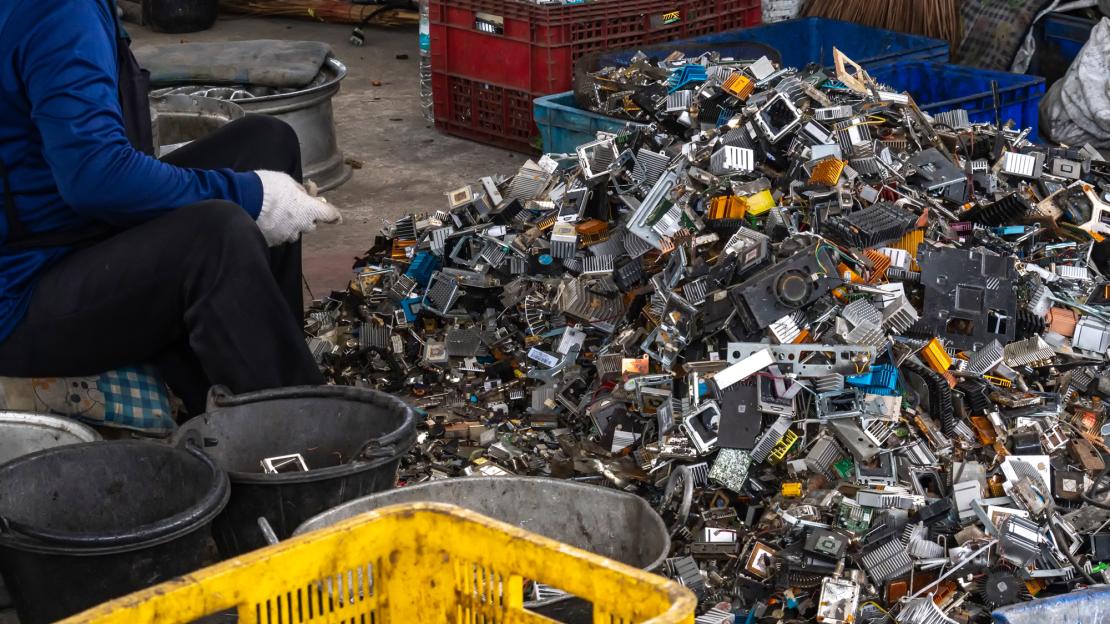A new U of T Scarborough study finds that a group of people living in the developing world suffer high levels of toxic emissions from chemicals commonly used in our consumer goods.
The study, published in the journal Environmental Science Letters, looked at emissions of PBDEs, a group of chemicals commonly used as flame retardants in cell phones, computers, textiles and furniture.
The researchers found that countries in Europe, North America and parts of Asia often “off-load” the toxic emissions associated with disposing of these products by sending electronic waste (e-waste) to the developing world.
“We should be held responsible for dealing with the waste generated by our society,” says Frank Wania, a professor in the department of physical and environmental sciences at U of T Scarborough and author of the study.
“It’s unethical to send our waste to developing countries or less wealthy parts of the world. If we rely on these chemicals for our products, then we should be responsible for disposing of them.”
PBDE emissions are highest in areas of China, India, Bangladesh and Western Africa. It takes place mostly when these products are being recycled, something often done in small backyard workshops with minimal safety standards. Wania says some emissions happen during the manufacture and use of the products, but the vast majority takes place during disposal.
We should be held responsible for dealing with the waste generated by our society
Exposure to PBDEs can have serious negative health consequences. Past studies on humans and animals show a link to neurodevelopment deficits, thyroid disruption, reproductive changes and cancer. While there’s a global restriction on new products containing the chemical, existing consumer products will be used and disposed of over the coming decades.
The researchers only looked at PBDEs for this study, but as Wania points out, there are many other chemicals in consumer products that can create harmful emissions when disposed.
“We cannot assume that what we found for these chemicals applies equally to other chemicals, but this research shows this type of analysis can be done and it’s conceivable it takes place for other chemicals as well,” he says.
Li Li, an assistant professor at the University of Nevada, Reno, and one of the study’s authors, says that China used to import about 70 per cent of the world’s traded e-waste, but that will likely change after recent regulations banning the practice.
Some areas in China have become known as e-waste recycling communities. The operations are hazardous for workers, who must manually separate products to salvage valuable materials such as gold, tungsten, cobalt and other precious metals. This is often done without proper safety or personal protective equipment.
-copy.jpg)
“It’s dangerous work,” says Wania, adding that these operations might start to shift more to Western Africa and developing regions of Asia due to new restrictions in China.
The research also highlights how a connected global economy means countries are trading not only products and chemicals, but waste. Consider a cell phone. One might be designed in California, manufactured in South Korea using flame retardant chemicals made in China, before getting exported to Europe. Once the phone is no longer in use, it then gets exported to China, South Asia or Western Africa for disposal.
“This is an environmental justice issue because the environmental burden of making and disposing of a product is not fully experienced by those who benefit from using the product,” says Wania.
Wania says the point of the study is not to be alarmist about the chemicals found in consumer products. He says the chemicals serve a purpose and many products simply wouldn’t exist or function well without them, adding that many are safe if handled and disposed of properly.
“Some chemicals are safer than others, and it’s our job to figure out which ones we should be worried about, especially in how they are disposed of,” he says.
He says the irony is that if these products were disposed of in developed countries, overall emissions of these chemicals would be lower because of stricter health and safety regulations.
“Exporting this waste not only means we shift the emissions to poorer parts of the world, but we also increase overall emissions because the regulatory environment isn’t as strong.”
